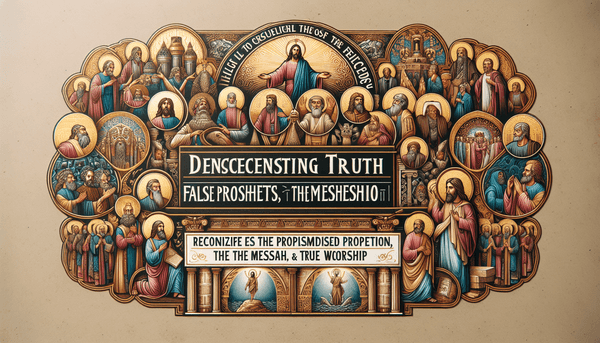The Essence and Purpose of Prayer
Prayer is an intimate form of communication between believers and God, a spiritual exercise that can be learned and developed over time. The essence of prayer is captured within the Lord's Prayer, a model given by Jesus Himself as a blueprint for our conversations with the Divine (Matthew 6:9-13). It opens up a space for adoration, confession, thanksgiving, and supplication, allowing us to praise God for who He is and His mighty works, as we are urged to in Psalm 100:4-5. This heartfelt act of worship, combined with obedience as seen in John 14:15, reflects God's love and character, drawing us into a deeper relationship with Him. Through prayer, we learn to express gratitude, repent of our sins, and humbly place our needs before God, aligning our hearts with His will.
Jesus' Teachings on Prayer
Jesus emphasized the importance of persistence and faithfulness in prayer. In Luke 11:5-13, He shares a parable about a persistent friend, teaching us that if even an earthly friend responds to persistence, how much more will God, our heavenly Father, respond to our persistent prayers. Jesus encourages us to approach God with faith, persistence, and trust, assuring us that God hears and answers our prayers according to His perfect will and timing. This passage reminds us that prayer is not just about asking for things, but about developing a relationship with God, who is always ready to listen and respond with love and wisdom (Matthew 7:7).
Forms of Prayer in the Bible
The Bible showcases various forms of prayer, each serving a unique purpose in the believer's life. Adoration is about praising God for His greatness and majesty, as we are compelled to do in Psalm 29:2. Confession involves acknowledging our sins before God, seeking forgiveness and cleansing, as 1 John 1:9 assures us. Thanksgiving is expressed through gratitude for all that God has done, a sentiment echoed in 1 Chronicles 16:34. Lastly, supplication is the act of laying our requests before God, as well as interceding for others, which Philippians 4:6 encourages us to do. Each form of prayer enriches our spiritual journey and fosters a closer walk with the Lord. For a deeper understanding of living a righteous life through prayer, see our article on exploring the depths of righteousness, law, and ethics in the Bible.
Personal Reflection and Practice of Prayer
Prayer is a deeply personal practice that requires sincerity and an earnest heart. Matthew 6:7-8 warns against empty repetition, urging us to seek a genuine connection with God. The Psalms provide numerous examples of heartfelt prayers, demonstrating that God values a sincere and contrite heart (Psalm 51:17). As we make prayer a part of our daily routine, we are reminded to pray without ceasing, maintaining a continuous dialogue with God throughout our day (1 Thessalonians 5:17). Moreover, the Christian community plays a key role in supporting and enriching our prayer lives, as we are encouraged to gather with fellow believers and uphold one another in prayer (Hebrews 10:24-25).
Conclusion
Prayer, as depicted in the Bible, is a rich and complex practice that encompasses adoration, confession, thanksgiving, and supplication. Through Jesus' teachings and the examples set forth in Scripture, believers are invited to deepen their understanding and practice of prayer. By embracing the diverse forms of prayer and aligning our hearts with God's will, we open ourselves to a more profound spiritual connection and the boundless grace that flows from divine communion. In the end, prayer remains a vital and transformative aspect of the Christian walk, a testament to the enduring relationship between the Creator and His creation.
FAQ
Q: Why does prayer need to be learned?
A: Prayer is a form of communication with God that can be learned and developed, much like any other form of communication. It helps believers understand its significance, deepen their connection with God, and align their hearts with His will.
Q: What else does Jesus want us to understand about prayer from Luke 11:5-13?
A: Jesus wants us to understand the importance of persistence, faith, and trust in prayer. He encourages us to be steadfast in our requests and assures us that God hears and answers our prayers in His perfect timing and will.
Q: Are there different forms of prayer mentioned in the Bible?
A: Yes, the Bible mentions various forms of prayer, including adoration, confession, thanksgiving, and supplication. Each form serves a distinct purpose in our spiritual lives.
Q: How long should my prayers be?
A: The Bible does not specify a particular length for prayers. The focus should be on the sincerity and heart behind the prayer rather than its length.






